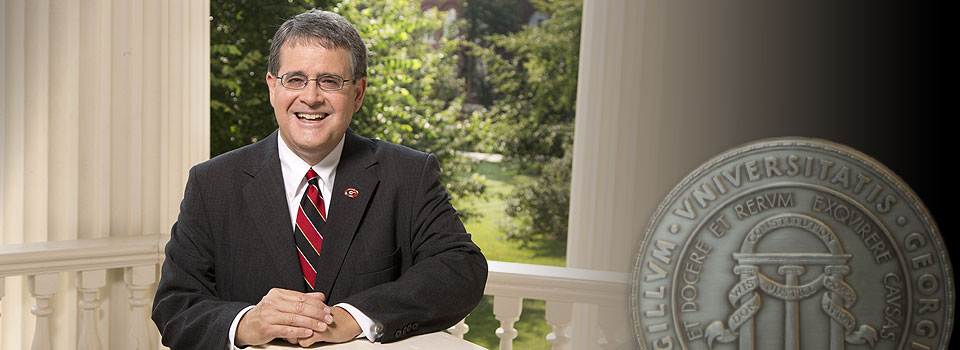With the installation of Jere W. Morehead as the 22nd president of the University of Georgia on July 1, UGA embarks on a transition in leadership that will impact the lives of many Georgians.
The UGA community alone consists of 35,000 students and nearly 10,000 faculty and staff. The university has a budget topping $1.4 billion and its economic impact on Athens has been estimated at more than $2 billion. As the first chartered state university in the U.S., UGA has its resources and expertise deployed throughout the state.
UGA’s impact is also global. UGA has permanent programs in Oxford, England; San Luis de Monteverde, Costa Rica; and Cortona, Italy. Its student body comes from locations reaching all edges of the globe.
From Abraham Baldwin, UGA’s first president, to Michael F. Adams, who served for 16 years and took the title of president emeritus on July 1, the university has grown from a couple of buildings on North Campus to more than 750 acres in the Athens area. It is consistently ranked as one of the top public universities in the country.
President Morehead said he plans to continue that growth and build on the university’s reputation. “I think the University of Georgia is a great institution. We reach out across this state, as we should as a land-grant institution, to serve the people of Georgia. We have substantially improved the quality of education on this campus,” Morehead said. “The quality of students has never been higher. The quality of our faculty has never been better, but we can’t settle for the status quo. If you settle for the status quo, you will begin to decline. So we have to look for ways, look for opportunities to improve this institution and that’s what this administration will be focused on doing.”
One of Morehead’s first major changes was to the organizational structure of the university’s administration. In May, he announced a new, flatter organizational structure that eliminated two senior vice president positions, keeping solely the senior vice president for academic affairs and provost. He plans to meet regularly with those reporting directly to him, as well as with the vice presidents and deans who will report to the provost, all in keeping with the goal to make UGA a better university.
“I think you do that by working in collaboration with others,” Morehead said. “You can’t do anything by yourself and so one of the things that I’ve always tried to do is make sure that I’m a good listener and that the people around me have an opportunity to have input, to be a part of the process of making something better.”
The Board of Regents of the University System of Georgia chose Morehead as the sole finalist for president in February. During the announcement of his selection, Chancellor Hank Huckaby said, “Having searched the country east to west, we found the person we wanted and needed right here on our campus, and that person is Jere Morehead.”
Morehead has served UGA as senior vice president and provost since 2010. He received his Juris Doctor degree in 1980 from UGA. After working for six years as a U.S. attorney for the Department of Justice, Morehead returned to join the UGA faculty. He has served as UGA’s vice president for instruction, vice provost for academic affairs, director of the Honors Program and acting executive director of legal affairs. Morehead also is the Meigs Professor of Legal Studies in the Terry College of Business.
Upon the announcement of his appointment, Morehead said he plans to focus on the upcoming capital fundraising campaign, on increasing the number of need-based scholarships and on playing a larger role in the economic development of Georgia.
His top priority, though, is very clear: “You can anticipate that when anyone that comes to see me about an issue or has a proposal, I’m going to ask a couple of questions. Is this going to improve the educational quality of our students or is it going to raise the academic profile and stature of the University of Georgia? If it doesn’t do one of those two things, then I think people will have a hard time convincing me it’s something that we need to be spending our time doing.
“(I) will look for ways to make a great institution even better, and you will find in me-in everything that I do-a focus on excellence, a focus on how can the University of Georgia be an institution that does more than it has ever done before, does it better than it’s ever done before, and does it in a way that will bring pride and respect from the citizens of Georgia and beyond.”


